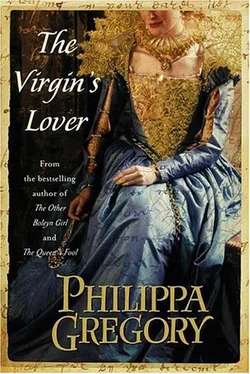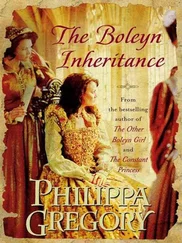“Did he say that he was coming here?” she asked.
“No,” Mrs. Woods said again, feeling uncomfortable at the shadow that passed over Amy’s face. “I expect he’s very busy at court,” she continued, trying to gloss over the awkward moment. “I doubt he’ll be able to get home for weeks.”
She could have bitten off her tongue in irritation at her own clumsiness as she realized that there was no home for this young woman and her husband. She fell back on the good manners of hospitality. Would Amy like to rest after her journey? Would she like to wash? Would she like to take her supper at once?
Amy said abruptly that she was sorry, that she was very tired, and she would rest in her room. She went quickly from the hall, leaving Mrs. Woods and Mrs. Oddingsell alone.
“She is tired,” Mrs. Oddingsell said. “I am afraid she is not strong.”
“Shall I send for our physician at Cambridge?” Mr. Woods suggested. “He’s very good, he would come at once. He’s very much in favor of cupping the patient to adjust the humors. She is very pale; is she of a watery humor, d’you think?”
Elizabeth Oddingsell shook her head. “She is in much discomfort,” she said.
Mr. Woods thought that she meant indigestion, and was about to offer arrowroot and milk, but Mrs. Woods, remembering the glimpse she had seen of Robert Dudley, dark-eyed on a black horse at the coronation procession, riding behind the queen as if he were prince consort himself, suddenly understood.
It was Cecil, not Dudley, who was at the queen’s side after dinner. She had been served with all the grandeur of the Tudor tradition, great plates passed down the long dining hall of Whitehall Palace, checked by the taster for poison, and presented to her on bent knee. Three of the servers were new and clumsy. They were Cecil’s men, spies put in place to watch and guard her, learning how to serve on bended knee at the same time.
Elizabeth took a very little from each plate and then sent them to her favorites, seated in the body of the hall. Sharp eyes watched where the best dishes went, and when a dish of stewed venison was sent to Dudley there were a few muttered complaints. The loud, joyful rumble of the court at dinner filled the great hall, the servants cleared the tables, and then Cecil was beckoned up to the dais and stood before the queen.
She gestured that the musicians should play; no one could hear their quiet conversation. “Any news of any hired killers?” she asked.
He saw the strain on her face. “You are safe,” he said steadily, though he knew he could never truly say that to her again. “The ports are watched, your gates are guarded. A mouse cannot come in without us knowing.”
She found a weak smile. “Good. Tell them to stay alert.”
He nodded.
“And as to Scotland: I read your note this afternoon. We cannot do what you propose,” she said. “We cannot support rebels against a queen, that is to subvert the rule of law. We have to wait and see what happens.”
It was as Cecil had expected. She had a mortal terror of making a mistake. It was as if she had lived on the brink of disaster for so long that she could bear to step neither forward nor back. And she was right to be cautious. Every decision in England had a hundred opponents, every change had a thousand. Anything that threatened a man’s individual prosperity made an enemy of him, anything that was to his benefit made him a grasping, unreliable ally. She was a queen newcome to her throne and the crown was dangerously unsteady on her head. She did not dare consider anything that might undermine the power of queens.
Cecil made sure that no sign of these thoughts showed on his face. It was his deep-rooted belief that the intelligence of a woman, even one as formidably educated as this, could not carry the burden of too much information, and the temperament of a woman, especially this one, was not strong enough to take decisions.
“I could never support a rebellion against a ruling queen,” she specified.
Tactfully Cecil avoided mentioning the years when Elizabeth had been the focus and sometimes instigator of a dozen plots against her pure-blood, anointed half-sister.
“It is all very well you wanting us to support the Scots Protestants against the regent, Queen Mary of Guise, but I cannot support any rebels against a ruling king or queen. I cannot meddle in another’s kingdom.”
“Indeed, but the French princess will meddle in yours,” he warned her. “Already she has the arms of England quartered on her shield, she considers herself the true heir to England, and half of England and most of Christendom would say she has the right. If her father-in-law, the French king, decides to support her claim to your throne, the French could invade England tomorrow, and what more useful stepping-stone than Scotland and the north? Her mother, a French-woman, holds Scotland for them as regent, already the French soldiers are massing on your northern border; what are they doing there, if not waiting to invade? This is a battle that must come. Better that we fight the French army in Scotland, with the Protestant Scots on our side, than we wait for them to come marching down the Great North Road when we do not know who might rise up for us and who might rise up for them.”
Elizabeth paused; the appearance of the English leopards on the shield of the daughter of Mary of Guise was an offense which went straight to her jealously possessive heart. “She dare not try to claim my throne. No one would rise up for her in preference to me,” she said boldly. “No one would want another Catholic Mary on the throne.”
“Hundreds would,” Cecil said dampeningly. “Thousands.”
That checked her, as he had known it would. He could see that she lost a little color.
“The people love me,” she asserted.
“Not all of them.”
She laughed but there was no real merriment in her voice. “Are you saying I have more friends in Scotland than in the north of England?”
“Yes,” he said bluntly.
“Philip of Spain would stand my ally if there was an invasion,” she declared.
“Yes, as long as he thinks that you will be his wife. But can you keep him thinking that for much longer? You cannot really mean to have him?”
Elizabeth giggled like a girl and, unaware of betraying herself, glanced across the room toward Robert Dudley, seated between two other handsome young men. Effortlessly, he outshone them. He tipped back his head to laugh and snapped his fingers for more wine. A servant, studiously ignoring other thirsty diners, leapt to do his bidding.
“I might marry Philip,” she said. “Or I might keep him waiting.”
“The important thing,” Cecil said gently, “is to choose a husband and get us an heir. That is the way to make the country safe against the Princess Mary. If you have a strong husband at your side and a son in the cradle, no one would want another queen. People would even overlook religion for a safe succession.”
“I have been offered no one I could be sure to like as a husband,” she said, warming to her favorite, most irritating theme. “And I am happy in my single state.”
“You are the queen,” Cecil said flatly. “And queens cannot choose the single state.”
Robert raised his goblet in a toast to the health of one of Elizabeth’s ladies, his most recent mistress; her friend nudged her and she simpered across the room to him. Elizabeth apparently saw nothing, but Cecil knew that she had missed none of it.
“And Scotland?” he prompted.
“It is a very great risk. All very well to say that the Scottish Lords Protestant might rise up against Mary of Guise, but what if they do not? Or if they do, and are defeated? Where are we then, but defeated in a war of our own making? And meddling in the affairs of an anointed queen. What is that to do, but to go against God’s will? And to invite a French invasion.”
Читать дальше
Конец ознакомительного отрывка
Купить книгу












